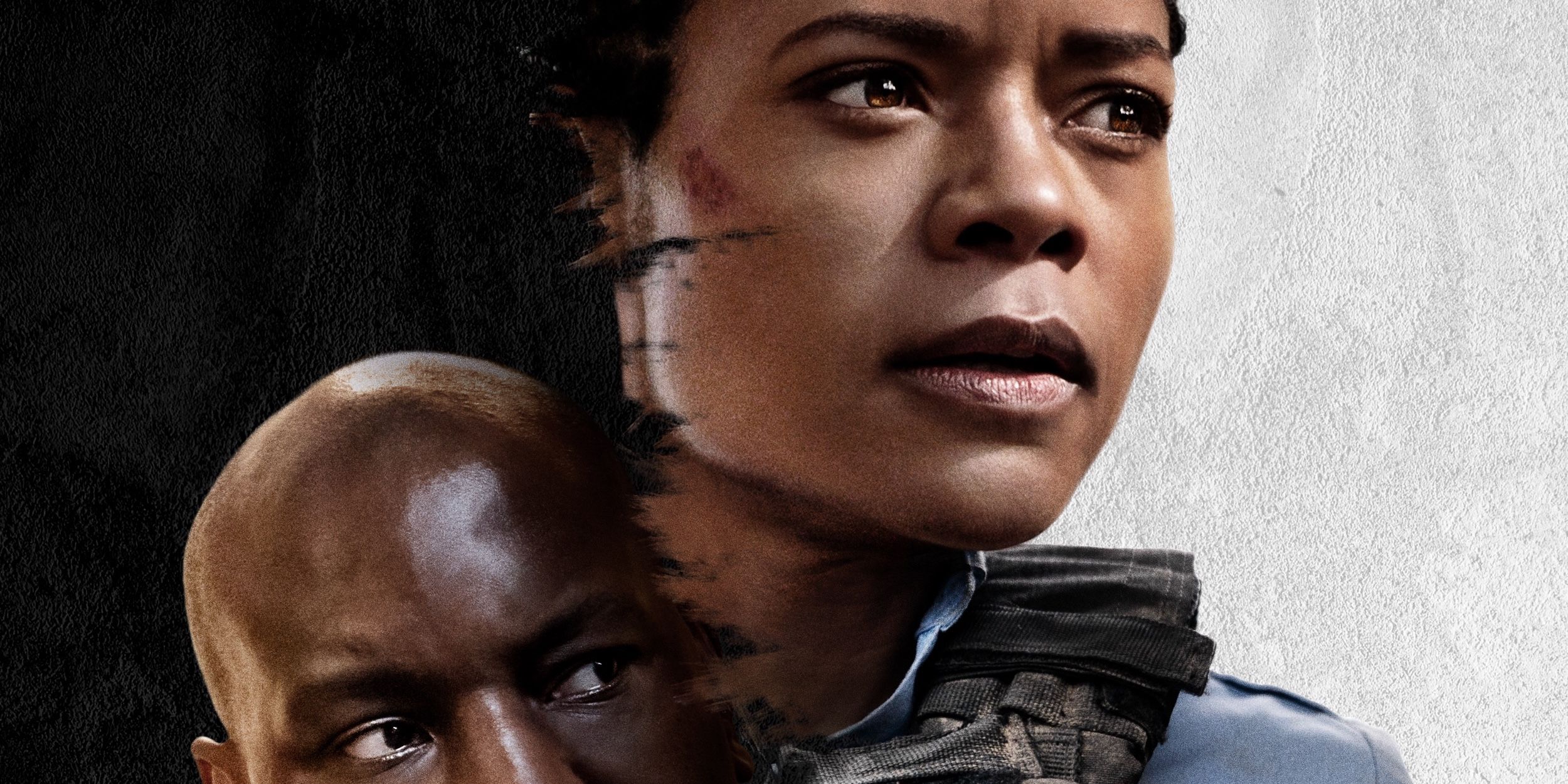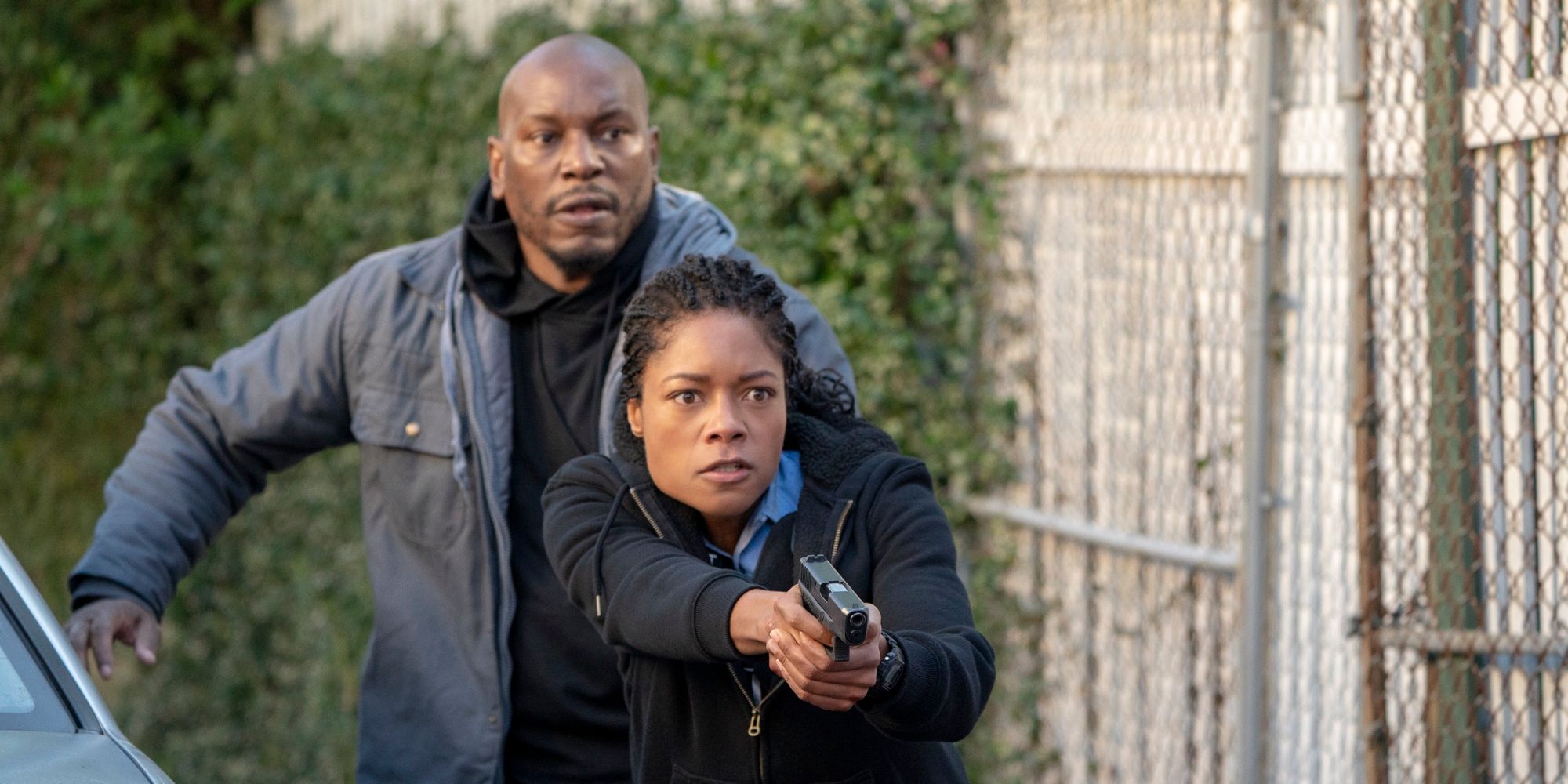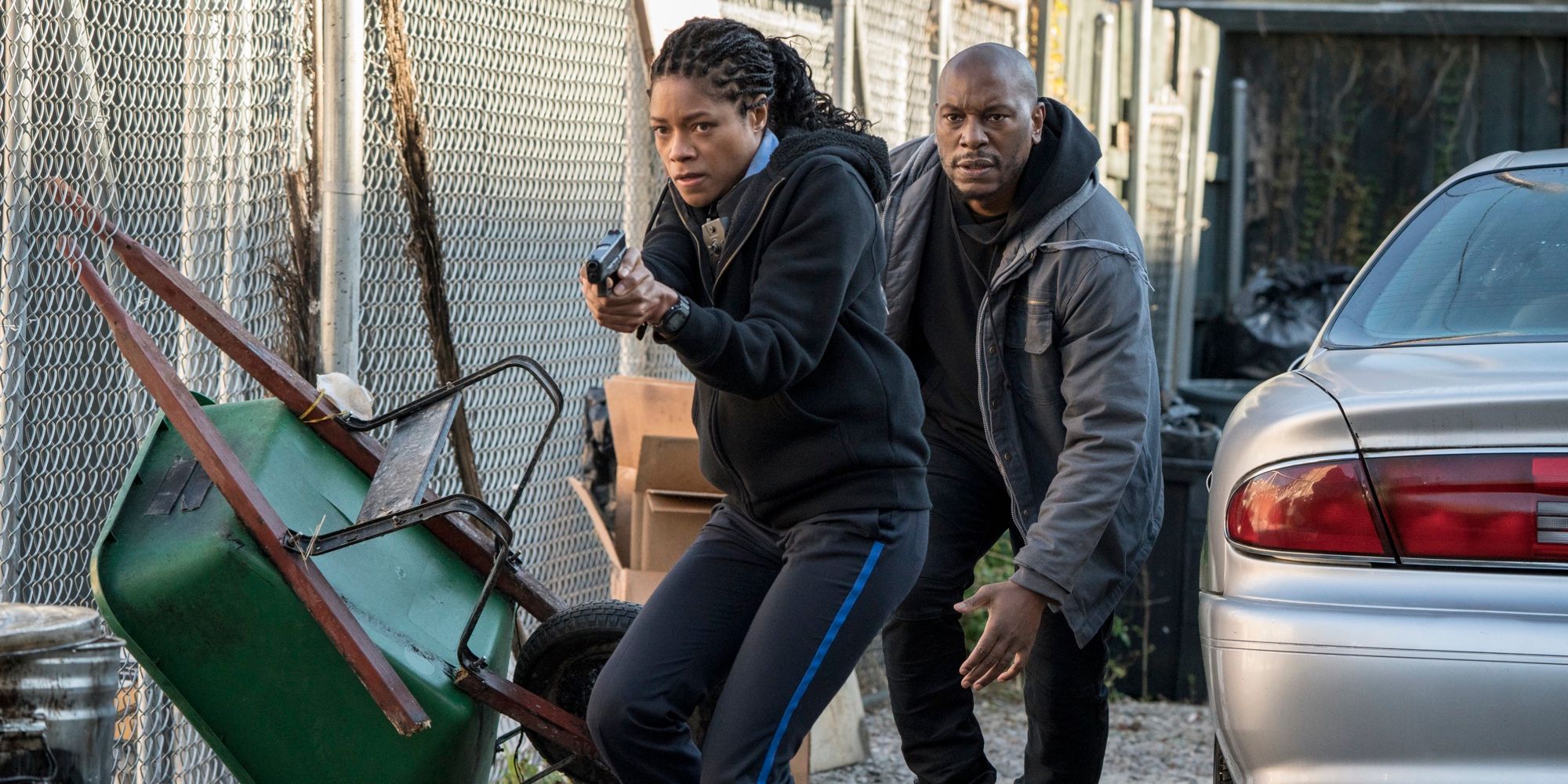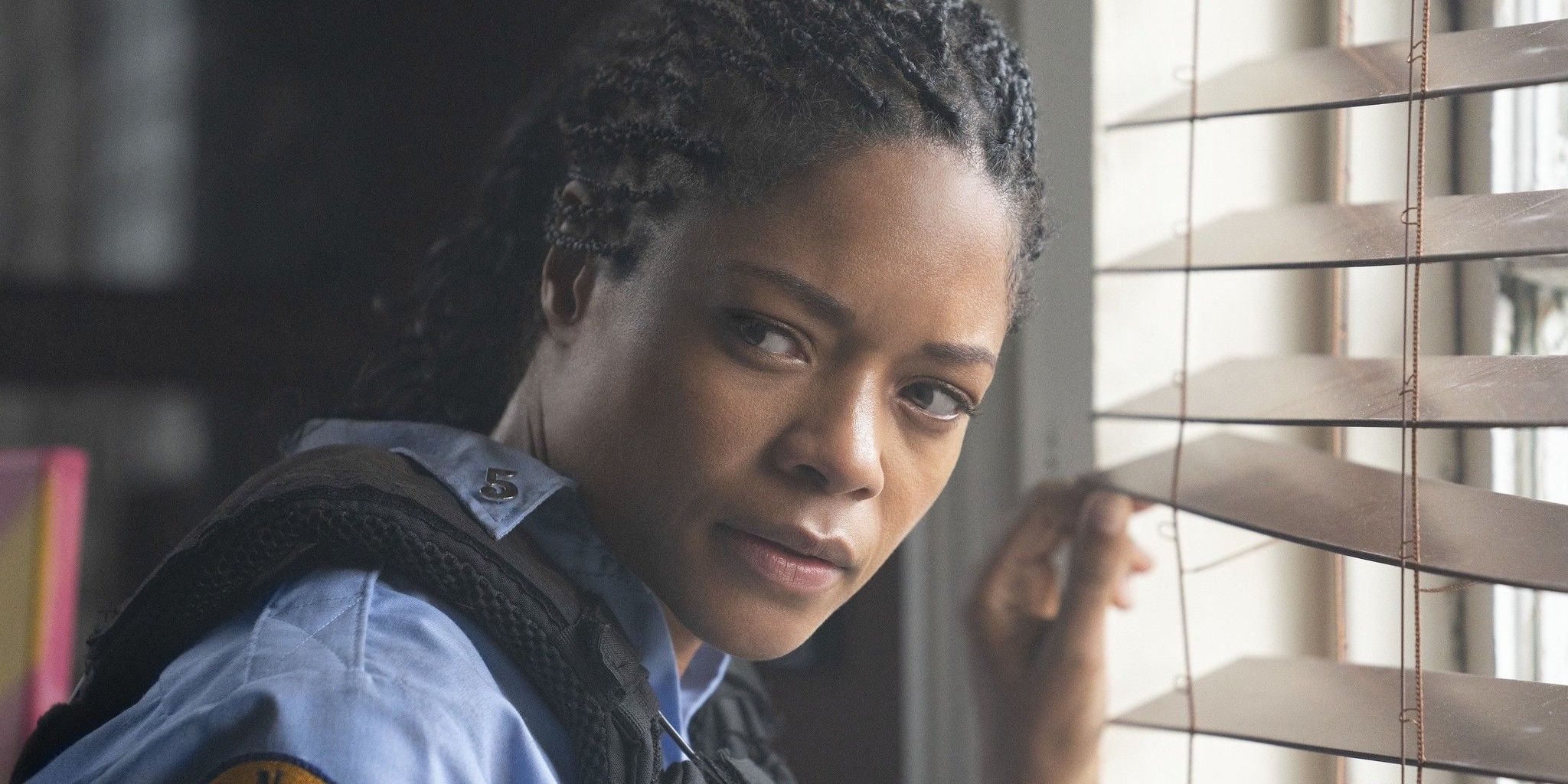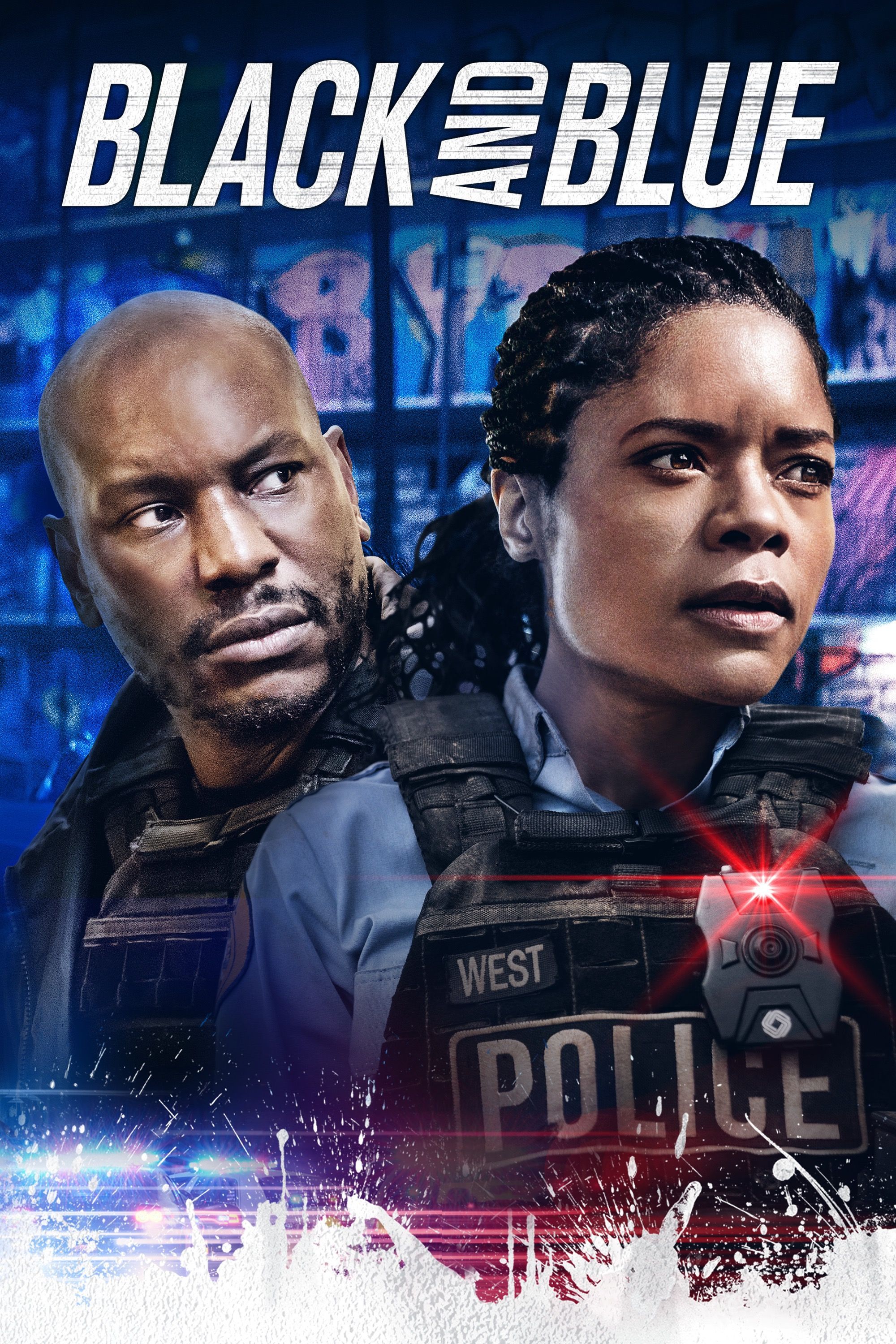Everyone knows how much a film depends on its cast, writer and director, and the buzz around Sony’s upcoming Black and Blue has created much anticipation for Naomie Harris’ performance paired with a strong script and tight direction. But the role of a producer is spoken of less often, even when they’re as instrumental to the film’s creation as Sean Sorensen has been.
Sorensen, who previously worked on Mayhem starring Steven Yeun, shared his experience bringing the cop thriller to life in a set visit during the film’s final shooting days. Screen Rant was able to not only witness Harris’ stunt double in action, but also see as Harris herself paid her respects to her character’s dead mother. But, most importantly, Sorensen gave a metaphorical tour of Black and Blue’s creative process.
Tell us what the film is about.
Sean Sorensen: This film is about Alicia West, who is a rookie cop. Her body cam captures her fellow officers murdering a drug dealer. So, they chase her in the streets of New Orleans to try to get that incriminating footage back. And, additionally, they tell all the gangs that she did the killing, so not only other cops after her, but all the gangs are after her as well. It’s a mess; I would not envy her.
Was it started by anything in particular?
Sean Sorensen: Actually, yes. There was a project that I was involved with that was a true story about a cop who had audio taped some of his fellow officers committing crimes. I had the rights, and I gave it to this writer that I worked with, Peter Dowling. We were developing this, and then something happened with the rights. They got a little messy, and it didn't work out.
So, we said, “Okay, we like that idea.” If we're not going to tell that true story, the writer’s idea was, “Let's make it visual. Let's make it a body cam.” Which is not only a good idea, but it's very timely. Now, not only is it in the news all the time, but there's actually shows dedicated – dedicated programs that are based on police footage from body cams, which is pretty interesting. I was watching it in preparation for this.
This one was originally set in Detroit. What was the decision to reset it to New Orleans about, and what did that involve?
Sean Sorensen: Detroit is snowing right now. I didn't want to deal with that.
The original story was based on a male cop. Why did you decide to switch to a female lead?
Sean Sorensen: You guys are asking good questions. That's a very good question. And you know why? There's a very specific answer. The writer, we're going to credit the writer of this, he kept hearing that there were no good roles for African American women. And he insisted on writing this as an African American woman; this is how the original script was. And I said, “Okay, I like that idea. But you realize the first thing that someone's going to do when we sell this is, they're going to turn it into a white man.” He said, “Fine, but at least we're gonna give it a shot.”
We sold it, and to Screen Gems’ credit, we kept it and we're making this movie with a black woman.
Why was Naomie Harris right for the lead role?
Sean Sorensen: Naomie Harris is as good as it gets. Not only is she beautiful and talented and smart, but I'll tell you something. I knew she was the right one for this from go but let me tell you how good she is. Early in the script, there's a scene, [that] I've never really liked in the movie. It's just kind of exposition. It's full of exposition, there's nothing to it; it's just to sort of set up her place.
But she encounters four different people in that scene. It's a lot of backstory and coming up to that we had shot a lot of the movie up to that point; it was there's a lot of good stuff. So, we're getting to the scene that I never liked. And she filmed the scene, and it's so good – this nothing scene – because she was able to do four separate, strong, distinct emotions in one scene, one cut. I was so impressed with her. I've never told her that; I should probably tell her.
She's impressive on so many levels here, but it's easy to be impressed with the big cataclysmic stuff; the big shows. But it's also those smaller things – things that you might not ever notice. Because she took nothing, and she made it made it a “wow” scene.
Can you talk in general about the character that she plays?
Sean Sorensen: She plays Alicia West, a cop who's one of those rare people who walks the walk. Written on the wall of her barracks in Afghanistan was a quote from Gandhi, which is, “Be the change you want to see in the world.”
It's not just be the change when it's convenient. It's not just be the change when you can get something out of it. It's be the change because it's the right thing to do. She's an impressive kind of person that I think we can all growth from and maybe make a change. In the story, because she believes this, slowly people start changing around her. And that's how you affect change in the world. Gandhi had something to it.
Virginia, Massachusetts, Mississippi, and Hawaii are trying to pass a law says drug dealers can be convicted with manslaughter if someone dies from doing their drugs. Are drug dealers portrayed more sympathetically in the movie, while still saying you shouldn’t follow their example?
Sean Sorensen: Well, that's her point, actually. I think there's a line in the movie that's, “Murder’s murder, it doesn't matter who you are.” That's another example. By the way, that line looks a little like a movie line, and I was in the process of coming up with a bunch of alt lines for that. But when I saw her deliver it, I was like, “Alright, we're gonna [keep it].” Again, to testify to Naomie’s amazing abilities as an actress.
But even that point is right, and that's a very on the nose way of saying it. But she was able to say it in a way that conveys not only the point, but also, she did a great job of selling that and getting that point across.
She risks everything.
Sean Sorensen: Yeah. It's easier for her to just give the body cam footage away. So, she's risking everything to do the right thing. And her point is, it doesn't matter if it's drug dealers or cops or anybody. She believes in doing the right thing.
Can you talk a little bit about how Deon Taylor became part of the project?
Sean Sorensen: Deon Taylor directed a number of films, and Sony Screen Gems bought one of his films… The Intruder. So, Screen Gems is responsible for bringing him on. But once he's been on, he and I hit it off pretty well.
I didn't know him before this, but now that we have worked together, we hit it off. I love his energy. I love his sense of humor; I love his indefatigable energy.
When you walk on a Deon Taylor set, you know within five minutes what kind of environment you're in. He sets the tone with the humor and the energy and the fun, and everyone on the crew and in the cast feel that. They feel comfortable and they feel family; they feel supportive.
Sometimes egos get in the way – not here. In other movies, you can have egos, you can have cat fighting, you can have discord – and there's none of that. There's none of it, because of Deon Taylor and the way he runs his movie set. It's been a pleasure to work with him on this. There have been challenges, and I've seen him meet those challenges. And he is he's a guy who is a great person, as well as a great director. And I put a premium on working with good people and people I like. He’s certainly at the top of the list.
Did you go back and look at his films once you were introduced by Screen Gems?
Sean Sorensen: Well, I looked at two. He's done a lot, and I've seen two of them. What I like about him is he sees the big picture. Like, when we're filming a scene here, he'll he knows where this ripples down into the whole script. We’ve got to get a certain aspect of it right here, so that the scene works later. He's a visionary. I put a premium on working with people I like, and he's certainly someone I love. I'm thrilled to be working with him on this project, and hopefully we end up making 10,000 more movies together.
Can you talk about some of the other characters and people that are playing those characters in the film?
Sean Sorensen: Sure. Some people that she ends up changing aren't necessarily eager participants to change the first. One person that she encounters is a guy named Mouse, someone that she used to know from back in the day as an acquaintance.
When she's shot, she doesn't know where to turn. She's been gone for a long time, so she goes to the first person that she can go to: this guy she doesn't know. He doesn't want anything to do with it. He doesn't want this; he has his own problems. But, reluctantly and almost unwillingly, he helps her. And eventually, her point, her energy ends up effecting the change. Because she is such a strong character, he's attracted to her as a as a person and he's influenced by her as a person. During the course of the movie, he goes from a guy who wants nothing to do with this to a guy who's eager to help and starts being an active participant in helping.
This is Tyrese’s character? Can you talk a little more about him?
Sean Sorensen: He's an artist. In fact, there's a there's a mural across the street that his character painted – it’s of a black Jesus. It’s really cool, actually.
I will say, Tyrese is very prepared. This is one of the first movies he's done a long time without, you know, acting against a green screen. He does a lot of these Transformers movies and the Fast and Furious movies, and this is an opportunity for him to actually act. And he takes it very seriously. I’m proud of it. I'm grateful and appreciative that he takes our movie, that he takes this job so seriously.
What does New Orleans bring to the table?
Sean Sorensen: Interesting question. I really like New Orleans. I've been here since December 4, and I've seen a lot of different aspects of New Orleans. I've seen parts of the city are really vibrant and beautiful, I've seen some that their businesses are emerging, and I've seen some that are still run down. That still haven't fully recovered from the from Katrina. But I've always seen that the people of New Orleans are not only resilient, but fun and full of life and, and the party must go on, and we must go on. And this is just from being here for three months, but I'm a fan of the city. I'm a fan of the people of the city.
The workers, a lot of the crew here, are from New Orleans – and we've hired several New Orleans actors. Lucky Johnson's a local actor. He's fantastic. He plays one of the thugs in the movie. He brings a real New Orleans vibe. Oscar Gale, who plays one of the shop owners, he's local. Frankie Smith is a guy who's a fantastic young actor. He plays a young thug who's a tech whiz. Deneen Tyler is Captain Hackett, the captain of the police department. She's fantastic.
Just really strong actors that, by the way, you look at their reels and their body of work. They're legit actors. They just happen to live in New Orleans.
And the rest of the cast?
Sean Sorensen: About the other actors that are in the movie, there's a guy called Reid Scott from Veep. He is a great guy. He's funny and, not only a great actor, but a great person. He plays Alicia’s partner, and he brings a strong comedic element to the film.
Frank Grillo is one of those guys that I – as a producer you notice things. You notice talent. So, watching a movie, I want to pay attention to who impresses me so I might use them against some time. Frank Grillo is one those guys where, the moment I saw him, I think it was Warrior – he's one of those guys that when I'm leaving the theater, I'm looking him up. “Who's that?”
I saw him again in this movie called The Grey. He's got such a verité. He's got a real emotional gravitas to everything he does. He's almost like Jason Bateman if Jason Bateman went to the gym. Frank is solid; he boxes in real life. He's a force of nature, and he's an incredibly impressive actor.
He plays a narcotics officer along with Beau Knapp, who plays Smitty in the movie. Beau, If you want to watch Beau Knapp on a show? Netflix’s Seven Seconds.
James Moses Black plays Brown. He is great. He's a very gifted actor. And he's an interesting guy, because the first time he showed up on set, he was cool and fun. He was joking around, and I'm like, “Is this the right guy?” Because Brown, he plays a cop that Alicia [meets]. Her regular partner is supposed to work a double, but he has date night. She takes a shift instead, and she's connected with this guy Brown for the first time. He's an old, wise sort of seen-it-all been-there done-that kind of tough guy.
But he’s so cool; he's so funny when he came on set that I said is, “Did we cast the right guy?” And the first thing, when they said rolling, he just transformed into Brown. He was scary. He’s great; he's really good in this.
Everybody's great. Mike Coulter, he's another guy that's not [like his character]. He plays the big drug dealer. He plays the kingpin; a bad dude. Mike Coulter is a good dude. He went on a 15-minute monologue about Game of Thrones.
[Nafessa Williams], she's someone that the studio found. I remember the studio calling me on the first day: “How was Nefessa Williams?” I said, “She's Missy.” She plays the character Missy. She played Missy so well; she had these gigantic fingernails. She acts with these fingernails and helped create the character. Man, what a powerhouse.
We have a bunch of cast that, in five years, these are all going to be household names. If they aren't already there. Everyone's on the upward trajectory; we got lucky to have such an amazing cast.
What has been the biggest challenge so far? Do you ever have continuity issues on set?
Sean Sorensen: Yeah, we do. But because Dante Spinotti is such a good cinematographer, we're hoping nobody cares or notices.
Day one and day two, we were filming one scene over two days. And the first day, it was beautiful. The next day, it was just drenched. So, we’ll see, won’t we? I think we did account for it in certain lighting situations, and we are even framing out certain things, framing in certain things. I think we're gonna be okay, but those are challenges to come up. Part of my job is solving problems and making sure that Deon has everything he needs to direct the movie he wants to direct. All the resources, and everything he needs creatively.
Yesterday was a good example, actually. We noticed that we were filming a scene that felt redundant because of other rewrites we had done, and we realized that we kind of covered some of this stuff. So, we had to figure it out. We sort of removed a character; we switched the character over here and we shot the scene in a different way. And it works great. But that's a testament to Deon being such a great collaborator and director and visionary, because he saw it, we came together and solved the problem. He's just a great director and thinks on the fly. I'm gonna say something else about him: he is a great communicator. He's an empower-er.
Some directors are screamers, where if somebody makes an error, they'll blame and there'll be a big show about it. That's not at all with Deon Taylor's about. He's about empowering that person, to give them what they need to make the make the right decisions next time. He's the change I want to see in the world.
Did you work in cooperation with the NOPD, so you can have their actual badges and logos and all that stuff?
Sean Sorensen: No, sir. It's called PDNO in our movie.
Did they have a problem with that?
Sean Sorensen: Well, it's about dirty cops. They weren't trying to hinder our production at all; they were actually very helpful to us. But out of out of respect for them, we decided that we're going to change it. I've met several officers, current and former officers, and they've been very helpful and kind to us and supportive of us, actually.
Is there anything that was tricky from a technical standpoint?
Sean Sorensen: Shooting two weeks of nights was just uncomfortable in that location. It was challenging. Stunts? When she gets shot, she falls hard. And that stuntwoman, Bethany Levy, did an amazing job. She's done an amazing job of everything. It’s not just a fall; she's spinning and falling. But she made it look like she brushes herself off and now what’s next? It looked hard to me, and it looked amazing. So, I'm excited. I'd like to see how this all comes together.
What do you hope people take away from the film?
Sean Sorensen: It starts with you, and it starts with action. If you want to change the world, quit complaining about it and start doing something about it. That's what I like about the character of Alicia: she walks the walk. I think action is the key to things.
Somebody was talking about a friend who's trying to be a writer, and they have a bunch of ideas. What’s ideas? Ideas are just nothing. A writer writes. In this case, it's one thing to talk about being a good person, it’s [another] thing to actually be a good person. She's trying to do the right thing, even when she risks her own life to do so. That’s somebody that I admire.
The Black Jesus mural, was it here or did you paint it especially for the film?
Sean Sorensen: We painted that. It's a miracle, actually, how this appeared. We had our art department do it. They have a very talented team.
The writer intentionally wrote a black Jesus mural into it. Alicia is someone who's willing to sacrifice herself to do the right thing, not unlike the Jesus figure. Without getting too aggrandizing. It's not an accurate comparison. She's selfless and wants to do the right things, so it was written into the [stars].
There is one in Detroit. There's a famous black Jesus mural there, so we thought that even though we're moving to this city, we should have that mural. I hope the mural stays. I think it's cool.

